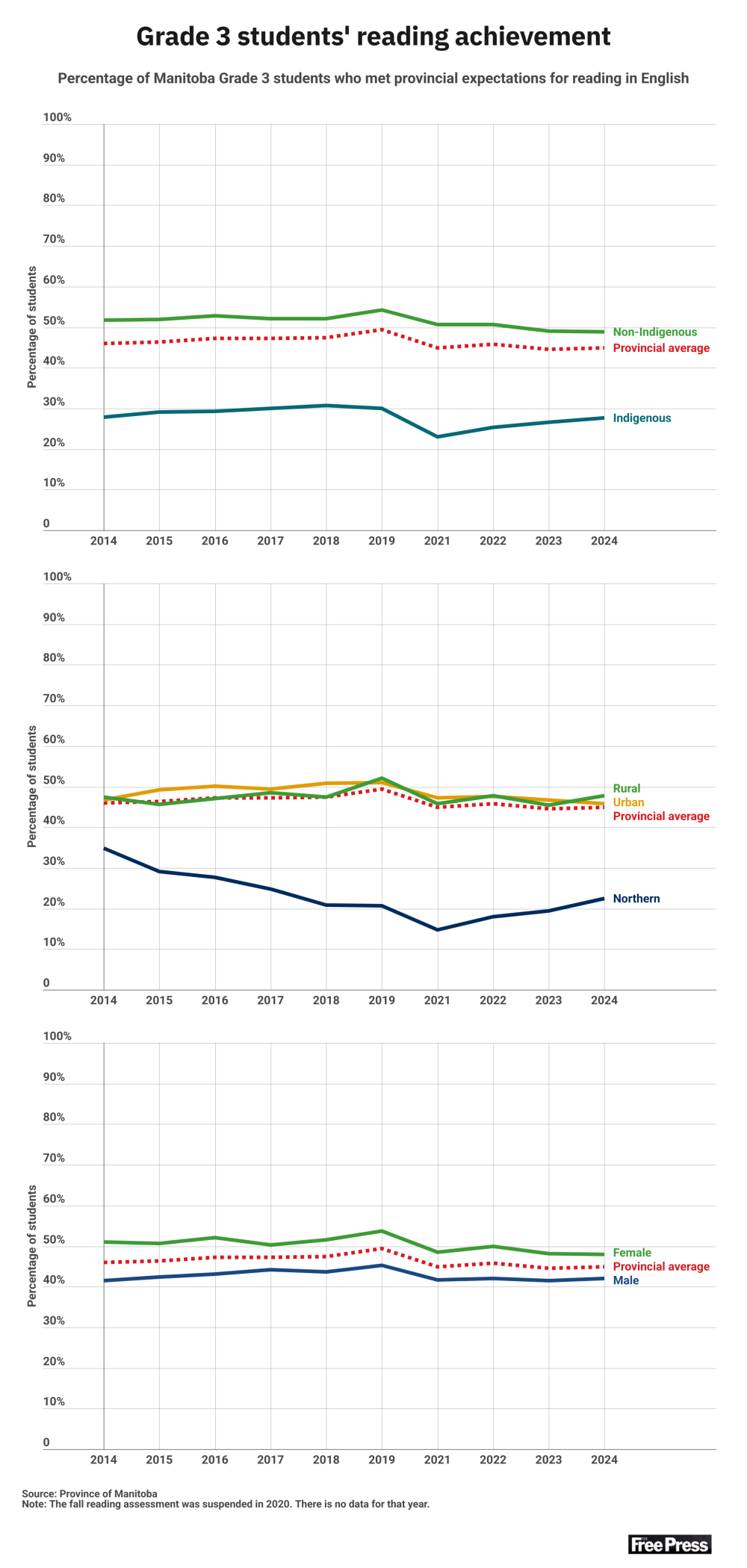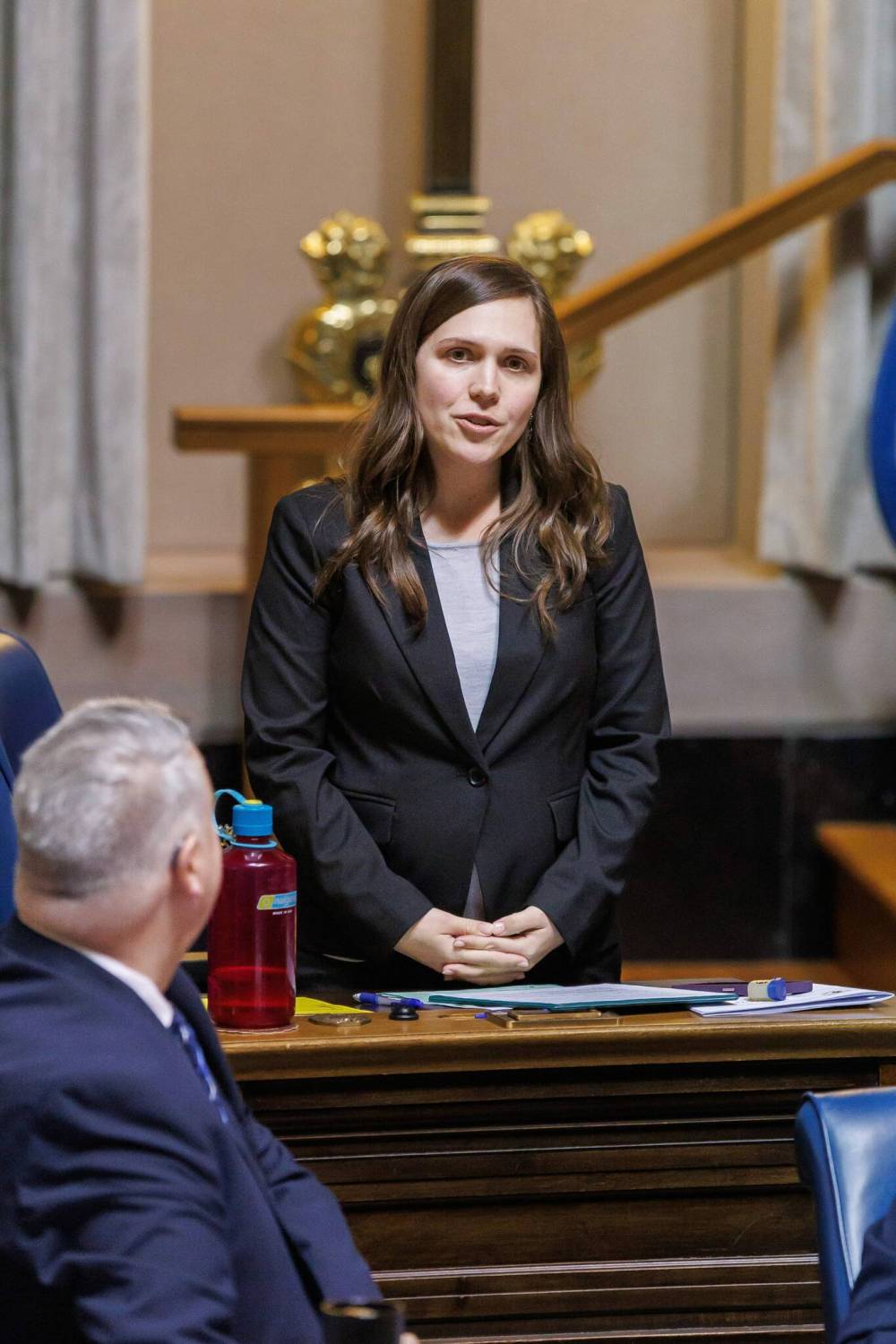Manitoba early reading screening legislation passes final test
Advertisement
Read this article for free:
or
Already have an account? Log in here »
To continue reading, please subscribe:
Monthly Digital Subscription
$0 for the first 4 weeks*
- Enjoy unlimited reading on winnipegfreepress.com
- Read the E-Edition, our digital replica newspaper
- Access News Break, our award-winning app
- Play interactive puzzles
*No charge for 4 weeks then price increases to the regular rate of $19.00 plus GST every four weeks. Offer available to new and qualified returning subscribers only. Cancel any time.
Monthly Digital Subscription
$4.75/week*
- Enjoy unlimited reading on winnipegfreepress.com
- Read the E-Edition, our digital replica newspaper
- Access News Break, our award-winning app
- Play interactive puzzles
*Billed as $19 plus GST every four weeks. Cancel any time.
To continue reading, please subscribe:
Add Free Press access to your Brandon Sun subscription for only an additional
$1 for the first 4 weeks*
*Your next subscription payment will increase by $1.00 and you will be charged $16.99 plus GST for four weeks. After four weeks, your payment will increase to $23.99 plus GST every four weeks.
Read unlimited articles for free today:
or
Already have an account? Log in here »
Manitoba’s poor literacy rate has prompted MLAs of all political stripes to unanimously endorse a private member’s bill to increase teacher monitoring and support for struggling readers.
Bill 225 requires elementary schools to systematically screen elementary students for early signs of struggle, immediately act on warning signs and document findings in report cards.
Tyndall Park MLA Cindy Lamoureux first tabled the legislation — now named the Public Schools Amendment Act (Early Reading Screening) — on March 26.

Lamoureux, the lone elected official representing the Manitoba Liberals, drafted it with parents and dyslexia advocates.
On Tuesday, following repeated pleas for the government to collaborate on adjustments, an updated version of it passed third reading.
“Unfortunately, here in Manitoba, literacy rates are very low,” Lamoureux told the house shortly before colleagues in all corners of the legislature supported her bill. “Forty per cent of children are meeting literacy standards right now. That’s exceptionally low — and these numbers are even lower for Indigenous children.”
Less than 45 per cent of Grade 3 students in Manitoba English programs were on track last fall, provincial data show.
That percentage rose to 49 per cent among non-Indigenous students. Less than a third of Indigenous children met grade-level expectations.
A total of 12,638 children — a fifth of this population identified as First Nations, Métis or Inuit — were tested as part of the province’s 2024-25 assessment program.
The COVID-19 pandemic suspended in-person learning, as well as 2020 reading assessments, but the number of students failing to meet early literacy targets has outnumbered on-track students in every Grade 3 cohort between 2014 and 2024.
Education Minister Tracy Schmidt hosted a midday news conference to thank Lamoureux and local teachers, parents and others who’ve been calling on the province to standardize early reading screening “for a long time.”
Bill 225 is anticipated to receive royal assent before the fall session ends this week.
When that happens, it will cement a recent ministerial directive into law. There was extensive debate about whether doing so was necessary because Schmidt gave kindergarten to Grade 4 teachers marching orders in April to prepare to carry out a mandate to do semi-regular universal screening starting in September 2026.
Schmidt called the outcome “a really great example of being able to work across party lines in the interests of our kids.”
She was flanked by Carrie Wood, a teacher and self-described dyslexia advocate who has visited the Manitoba legislature multiple times in recent weeks in support of the cause.
Wood, a mother of two, called the status quo a “wait-to-fail model.”
“We’re waiting and hoping that they grow out of their reading difficulties,” Wood said, noting both of her children regularly see private tutors because they did not grow out of their reading difficulties.
She told reporters Bill 225 will ensure she and her teacher-colleagues have the proper tools to recognize when a child is grappling with foundational literacy skills and act faster so they don’t worsen.
MLAs reached a consensus about the bill less than a week after the human rights commission published its long-awaited Right to Read report.
The 70-page document, which draws on feedback from public hearings, surveys and stakeholder consultations, called into question the effectiveness of current literacy lessons.

MIKE DEAL / FREE PRESS FILES
Tyndall Park MLA Cindy Lamoureux tabled the legislation now called the Public Schools Amendment Act (Early Reading Screening) — on March 26.
Investigators concluded local schools have been ignoring neuroscience-backed methods — direct and explicit phonics instruction — to teach children to read.
The legislation will require schools use a minister-approved screener, a test that is estimated to take about five minutes per student, twice in at least three of a student’s K-4 years.
Schools are obligated to release results on report cards and if a pupil is identified as having a reading difficulty, they must be monitored, receive “appropriate programming” and assessed by a clinician if need be.
Progressive Conservative MLA Kathleen Cook, a mother of four school-aged children, spoke in support of Bill 225 in the chamber and outside it Tuesday. Cook said in an interview the official Opposition was pleased to support this “good legislation.”
The MLA for Roblin said she has repeatedly heard concerns from constituents whose children are not confident readers.
Cook noted the standing committee on social and economic development heard the same heartbreaking story over and over on Oct. 8, when 38 people registered to speak about the proposal at the legislature during a meeting that took place on World Dyslexia Awareness Day.
Speakers spent hours describing firsthand frustrations related to getting struggling readers support via public schools and the costly fees they’ve paid for external clinicians, tutoring and in some cases, private school.
As far as Cook is concerned, universal screening is a good first step, but evidence-based instruction and intervention is also critical.
The education minister indicated she’s reviewed the Manitoba Human Rights Commission’s new recommendations and her office is creating a plan to address them.
“Time is of the essence in building reading skills,” co-author Karen Sharma said at the Right to Read report launch at the Centre culturel franco-manitobain on Thursday.
Sharma told a 200-person crowd that literacy gaps worsen throughout a child’s schooling career if they are not addressed early on.
“We can’t wait. We can’t have systems where students are having to wait years to get the diagnosis they need, in order to access the supports that they need,” the executive director said. “We need systems that are much more nimble and responsive.”
The auditorium, which was filled with parents of children with both diagnosed learning disabilities and suspected ones, erupted into applause.
maggie.macintosh@freepress.mb.ca

Maggie Macintosh
Education reporter
Maggie Macintosh reports on education for the Free Press. Originally from Hamilton, Ont., she first reported for the Free Press in 2017. Read more about Maggie.
Funding for the Free Press education reporter comes from the Government of Canada through the Local Journalism Initiative.
Every piece of reporting Maggie produces is reviewed by an editing team before it is posted online or published in print — part of the Free Press‘s tradition, since 1872, of producing reliable independent journalism. Read more about Free Press’s history and mandate, and learn how our newsroom operates.
Our newsroom depends on a growing audience of readers to power our journalism. If you are not a paid reader, please consider becoming a subscriber.
Our newsroom depends on its audience of readers to power our journalism. Thank you for your support.
History
Updated on Tuesday, November 4, 2025 7:24 PM CST: Fixes typo.


